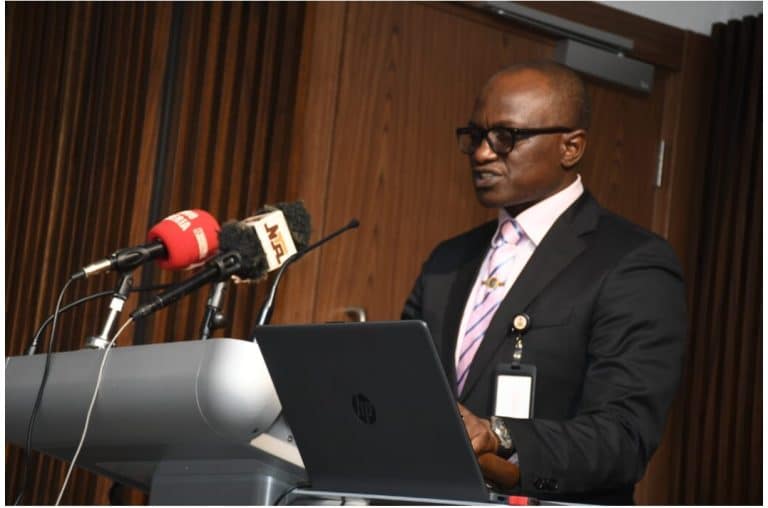An audit report by the Auditor-General for the Federation has uncovered financial irregularities totalling over ₦4.64 billion in the Federal Ministry of Works (Housing Sector), raising serious concerns about compliance with financial and procurement regulations during Babatunde Fashola’s tenure as Minister of Works and Housing.
According to Punch, the findings, covering activities from 2020 to 2021, revealed significant lapses in internal controls, including undocumented payments, extra-budgetary expenditures, excessive mobilisation fees, and contracts awarded without following due process.
A glaring example was the payment of ₦1.08bn from the Government Integrated Financial Management Information System (GIFMIS) account without requisite payment vouchers, a violation of Paragraph 601 of the Financial Regulations, 2009.
Additionally, ₦546m was transferred to project accounts without adequate documentation or budgetary provision.
The report further unearthed extra-budgetary expenditures of ₦2.89bn, including ₦1.88bn spent without legislative appropriation.
Notably, over ₦1bn was paid to contractors for road projects in Katsina State that were only included in the 2017 Appropriation Act. These expenditures contravene Section 80(4) of the 1999 Constitution, which requires legislative approval for all withdrawals from public funds.
The Auditor-General also flagged violations of procurement laws, such as awarding contracts above approved thresholds and without proper documentation.
Despite audit queries, the Ministry failed to provide satisfactory responses or justifications for these irregularities. The Auditor-General recommended that the Permanent Secretary justify the payments, recover misappropriated funds, and remit them to the Treasury.
It was also suggested that evidence of compliance should be submitted to the National Assembly’s Public Accounts Committees, failing which sanctions under Paragraph 3106 of the Financial Regulations should apply.
The National Assembly’s Public Accounts Committees are expected to take up the matter in subsequent sittings.
The audit report read, “The sum of ₦1,883,795,670.51 (One billion, eight hundred and eighty-three million, seven hundred and ninety-five thousand, six hundred and seventy naira, fifty-one kobo) was expended by the Ministry without evidence of appropriation.
“The sum of ₦1,003,039,708.79 (One billion, three million, thirty-nine thousand, seven hundred and eight naira, seventy-nine kobo) was paid to four contractors for the construction of roads in Daura, Katsina State. The project was budgeted for in the 2017 Appropriation Act, and
“Approval for the extra-budgetary expenditures in (i) and (ii) above, totalling ₦2,886,835,379.30 (Two billion, eight hundred and eighty-six million, eight hundred and thirty-five thousand, three hundred and seventy-nine naira, thirty kobo) by the National Assembly was not presented for audit.
“The above anomalies could be attributed to weaknesses in the internal control system at the Federal Ministry of Works (Housing Sector).”
The lack of adherence to financial accountability standards raises concerns about the potential diversion of public funds.
The report called for the recovery of the unauthorised funds and recommended sanctions for those responsible under relevant financial regulations.
The report further revealed contracts worth ₦493.97m were awarded to companies not registered with the Corporate Affairs Commission.
Of this amount, ₦170.36m was paid to unregistered entities, and a company awarded a contract in 2016 was only registered in 2019, contravening the Public Procurement Act, 2007, and the Companies and Allied Matters Act, 2020.
The absence of legal registration increases the risk of contract non-execution, fund mismanagement, and payment to ghost entities.
The audit report noted, “Payment for Contracts totalling ₦493,967,484.24 (Four hundred and ninety-three million, nine hundred and sixty-seven thousand, four hundred and eighty-four naira, twenty-four kobo) were made to non-existing companies.
“The sum of ₦5,825,989.28 (Five million, eight hundred and twenty-five thousand, nine hundred and eighty-nine naira, twenty-eight kobo) was paid to a contractor vide payment voucher with Ref. No PROC/PBHD/CAP1345/2020 dated 30th December, 2020, out of the total contract sum of ₦493,967,484.24 without the company being incorporated.
“Three contractors were paid a total of ₦170,355,961.05 without evidence of incorporation with the Corporate Affairs Commission (CAC).
“A company that was awarded a contract on the 25th of November, 2016 was incorporated with CAC on the 16th of August, 2019.
“The above anomalies could be attributed to weaknesses in the internal control system at the Federal Ministry of Works (Housing Sector).”
The Ministry was advised to recover the funds, ensure remittance to the Treasury, and implement sanctions against officials involved in the irregular awards.
The report also noted that in Oyo State, the ministry paid N110.81m, representing 22.61 per cent of a total contract sum, as mobilisation fees for a project, exceeding the 15 per cent limit prescribed by Paragraph 2933 of the Financial Regulations.
The contract was also irregularly awarded on a Sunday, further raising concerns about procedural integrity.
The report called for the recovery of the excess payment and recommended strict sanctions for gross misconduct under Paragraph 3129 of the Financial Regulations.
Also, a contract worth ₦46.31m for classroom construction in Edo State was awarded without adhering to due process.
The report further noted that ₦40.83m, representing 88.18 per cent of the contract sum, was paid to the contractor, exceeding mobilisation thresholds.
The lack of documentation, such as tender evaluations and approvals, exposes the ministry to risks of incomplete projects and fund diversion.
Five contracts worth ₦27.84m were awarded without obtaining bids from at least three unrelated contractors, as required under Section 24(1) of the Public Procurement Act, 2007.
The ministry also failed to present essential documents, including advertisements, tender evaluations, and meeting minutes.
The Auditor-General’s report paints a grim picture of financial management in the Federal Ministry of Works (Housing Sector), citing pervasive internal control weaknesses, poor compliance, and lack of accountability.
The report stressed the need for urgent reforms to prevent further financial mismanagement and safeguard public funds.
On Monday, the Senate vowed to invoke parliamentary sanctions against any head of a federal government agency indicted for financial infractions in the report submitted to the National Assembly by the Auditor-General for the Federation.
The Chairman of the Senate Committee on Legislative Compliance, Senator Garba Madoki, gave the warning at a one-day roundtable workshop in Abuja.
Madoki lamented the rate at which heads of the MDAs have been shunning Senate summons and warned that further disregard for the resolutions of the red chamber would no longer be tolerated.







